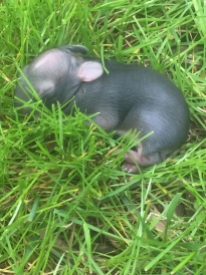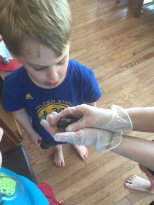Friends, it is a cluster.
A legit, what-the-heck-nightmare-did-I just-wake-up-in cluster.
E-learning, I mean, for those of you who have no idea what the HELL ON EARTH I’m referring to.
E-learning in, Jamie out: today, in the face of 1st grade literature and 4th grade art, I lost it.
To my credit, it was the first time I’ve lost it during the entire course of the COVID affair. I’m kind of proud it took me this long.
For about 30 minutes this morning I was just flat out angry. Angry with the kids for fighting. Angry with the dogs for barking. Angry at Google for creating a terrible classroom program. Angry at the disease that led us to this place.
We started at 9am and by 9:57, I was in tears. Not that the kids noticed, but I was.
Teachers are trying their hardest. I believe administrators are as well. But this is new to everyone, and the learning curve is steep. Do we watch the videos first or look at the messages? Why am I still getting stuff on Dojo? What’s with the 404 error—I was just there 2 seconds ago!
And I’m an over-educated, tech savvy SAHM. I can’t imagine what this mess is like for non-English speakers; people working, whether from home or not; those doing school on cell phones in parking lots to use the wifi; disabled students; special education students; and the list goes on.
This is hard.
But we’re doing it. We’re all doing it. We’re going to get it right sometimes and wrong other times, and I think that’s okay. No, I know that’s okay. Really.
But I digress.
At some point in the mess of today everything kind of clicked. I grabbed onto that moment and hung on for dear life, rushing to write down the daily schedule that I hope will work for us over the course of this Corona School adventure. I beg you—please, please, please don’t breathe on it; if you do, it will fall apart. It’s only tied by a thread.
I’m 100% sure that this is easier than it seems. Truly. But the universal “we” are overloaded and can’t get the brain power together for just One More Thing. One more is too much. It pushes us over edges we didn’t know were there until it was too late to turn around. So, we fall.
Do you remember playing Ring Around the Rosie? It was supposedly written in a time of plague, but that actually isn’t true. It was simply a game.
Today, in our own time of plague, I can’t help but think of that song. Not as a representation of us all carrying posies to ward off disease or falling to our deaths, but instead as a representation of our common plight and the support we’re scrounging deep inside our own disheveledness to find for one another.
You know the part where it says, “we all fall DOWN!” and everyone collapses into a giggling heap, thrilled with themselves and maybe slightly dizzy from holding hands and spinning around? Well, that’s us right now. All of us across America. OK, maybe not holding actual hands because, you know, coronavirus, but nonetheless holding metaphorical hands through text chains, social media, Zoom, and FaceTime. Watching the whole world spin around us, knowing that any minute we will fall, but also knowing that’s okay, because we won’t fall down alone: we will all be in that dizzy heap together. And when we’re done laughing at our collective ridiculousness, we will lift each other up, finding our feet under us once again.
Today isn’t over yet and I don’t know what the remaining hours will bring. Whatever it is, however, I may forget. Because the COVID memory I will put to words today is one of a child’s game, a playground and friends standing close, laughing, singing a song of roses and ashes that ends not when the players fall, but rather when they help one another to rise.
















